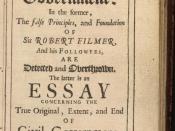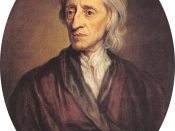In the Second Treatise of Government by John Locke written in 1690, he writes about the right to private property. In chapter V which is titled "Of Property" he tells how the right to private property originated, the role it plays in the state of nature, the limitations that are set on the rights of private property, the role the invention of money played in property rights and the role property rights play after the establishment of government.
Locke makes significant points about private property. According to Locke, the right to private property originated when God gave the world to men. (Locke was a huge fan of God in this chapter!) Locke makes the argument that when God created the world for man, he gave man reason to make use of the world to the best advantage of life, and convenience. What he means by that is, that God made this world for man, and when he made it he gave man the right to use what is in this world to his benefit.
Locke explains that every man has property in his own person, and that nobody has any right to that property but that person. The author states that "whatsoever then he removes out of the state of nature hath provided, and left it in, he hath mixed his labour with, and joined to it something that is his own, and thereby makes it his property". What Locke means by that statement is that once a person removes something out of its original state of nature that something becomes that persons property.
SO, Locke's ideas of property are based on God given rights. Each person has been given a body, with certain abilities and potentials, to use by God. The use of this body is called labor and...



Useful
Good Essay well written. I like the link between property and god given rights.
0 out of 0 people found this comment useful.